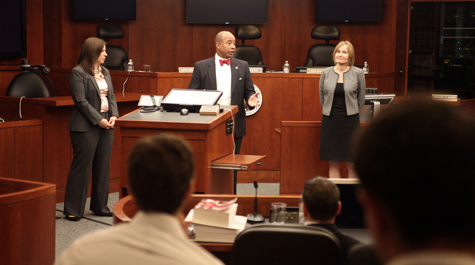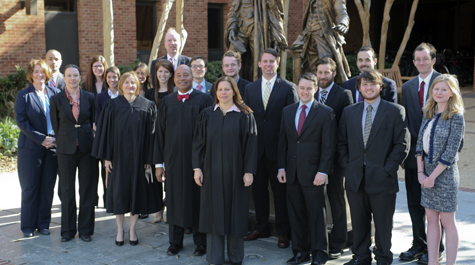Court of Appeals for Veterans Claims Holds Hearing
Court was in session on Wednesday, April 1, when the Court of Appeals for Veterans Claims heard oral arguments in William & Mary Law School's McGlothlin Courtroom. The event was a rare and valuable opportunity for students to see two experienced advocates argue before a three-judge panel of the court.
Read the Daily Press story and watch the video. Read the Virginian-Pilot story.
Created in 1988, the court has exclusive jurisdiction to judicially review final decisions by the Board of Veterans' Appeals. Although located in Washington, D.C., the court is national and may hear cases anywhere in the United States.
"This is a tremendous benefit for all of us that they came here as part of their educational mission," said Davison M. Douglas, Dean and Hanson Professor of Law. "It really is an incredible experience for our students to see the court in action."
A panel of three judges-Robert Davis (presiding), Mary Schoelen, and Margaret Bartley-heard the oral arguments. The case, McKinney v. McDonald, involved statutory interpretation of what Congress meant when it said that a condition pre-existing service does not qualify for VA disability benefits.
Students from the Law School's Lewis B. Puller, Jr. Veterans Benefits Clinic studied the process intently. No verdict was rendered at the hearing, but once arguments concluded, the judges took questions from students. Three law clerks from the court were also on hand to share their experiences.
"The opportunities to see an oral argument for an appellate case are few and far between, so having the opportunity to see one is always great, but it's better when the case, like this one, will have a dramatic impact on the area of the law to which it pertains," said Christopher Yakubisin, J.D. '16.
Yakubisin is anxious to follow the case and see how the court renders its decision.
"However this case is decided, I think it will have an impact on how our veterans must argue their claims in the future," he said. "While I certainly found myself on the appellant's side, it seemed that the court could go either way in deciding this case."
As a member of the Moot Court team, Jennifer Daniel Kahl, J.D. '15 has role-played appellate arguments countless times, but had never actually seen a real appellate argument. She was pleased to see that it was exactly what she had been practicing all along.
"It was instructive and encouraging to see that what I had been taught in school had direct application to actual practice; it made me think, 'I could do that,' Kahl said. "I'm very glad that the Law School arranged for this argument so that I could see the things I'd learned put into practice."
Before the hearing, the audience was shown a video about the mission of the court and its educational outreach program. According to Judge Davis, the outreach not only benefits students, but the court itself.
"In 2004, when I was appointed and Judge Schoelen was appointed, there were not that many law schools that even knew what veterans law was, much less had any clinics," Davis said. "We've been at the forefront of what I'd like to say is the veterans law development process."
Davis added that outreach not only gives the court marketing capacity, but it also puts it in touch with law students, the legal side of education, and potential interns and law clerks.
"Our veterans are from all over the country; many of us believe it's important for the court to show its flag and colors around the country, so we may be doing more of these if money and time permit in other parts of the country," Davis said.
Schoenlen added that it behooves the court to have quality lawyers representing veterans appear before it, because the court's job is made easier.
"If we can inspire people to think about pro bono as an area they'd like to devote their volunteer time to, that's a huge benefit to the court and to the legal community at large," she said.
Students also had a chance to lunch with the judges, where they were able to talk in more detail about the court.
"I suspect that as a result of today there may be a few law students who five years from now will be doing some pro bono work in this area of the law because they were so inspired by what they saw here today," Douglas said.
About William & Mary Law School
Thomas Jefferson founded William & Mary Law School in 1779 to train leaders for the new nation. Now in its third century, America's oldest law school continues its historic mission of educating citizen lawyers who are prepared both to lead and to serve.


